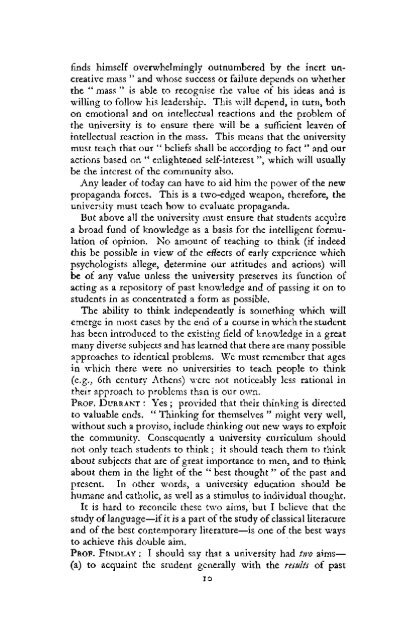Theoria - DISA
Theoria - DISA
Theoria - DISA
Create successful ePaper yourself
Turn your PDF publications into a flip-book with our unique Google optimized e-Paper software.
finds himself overwhelmingly outnumbered by the inert uncreative<br />
mass " and whose success or failure depends on whether<br />
the " mass " is able to recognise the value of his ideas and is<br />
willing to follow his leadership. This will depend, in turn, both<br />
on emotional and on intellectual reactions and the problem of<br />
the university is to ensure there will be a sufficient leaven of<br />
intellectual reaction in the mass. This means that the university<br />
must teach that our " beliefs shall be according to fact " and our<br />
actions based on " enlightened self-interest ", which will usually<br />
be the interest of the community also.<br />
Any leader of today can have to aid him the power of the new<br />
propaganda forces. This is a two-edged weapon, therefore, the<br />
university must teach how to evaluate propaganda.<br />
But above all the university must ensure that students acquire<br />
a broad fund of knowledge as a basis for the intelligent formulation<br />
of opinion. No amount of teaching to think (if indeed<br />
this be possible in view of the effects of early experience which<br />
psychologists allege, determine our attitudes and actions) will<br />
be of any value unless the university preserves its function of<br />
acting as a repository of past knowledge and of passing it on to<br />
students in as concentrated a form as possible.<br />
The ability to think independently is something which will<br />
emerge in most cases by the end of a course in which the student<br />
has been introduced to the existing field of knowledge in a great<br />
many diverse subjects and has learned that there are many possible<br />
approaches to identical problems. We must remember that ages<br />
in which there were no universities to teach people to think<br />
(e.g., 6th century Athens) were not noticeably less rational in<br />
their approach to problems than is our own.<br />
PROF. DURRANT : Yes ; provided that their thinking is directed<br />
to valuable ends. " Thinking for themselves " might very well,<br />
without such a proviso, include thinking out new ways to exploit<br />
the community. Consequently a university curriculum should<br />
not only teach students to think; it should teach them to think<br />
about subjects that are of great importance to men, and to think<br />
about them in the light of the " best thought " of the past and<br />
present. In other words, a university education should be<br />
humane and catholic, as well as a stimulus to individual thought.<br />
It is hard to reconcile these two aims, but I believe that the<br />
study of language—if it is a part of the study of classical literature<br />
and of the best contemporary literature—is one of the best ways<br />
to achieve this double aim.<br />
PROF. FINDLAY : I should say that a university had two aims—<br />
(a) to acquaint the student generally with the results of past<br />
10
















